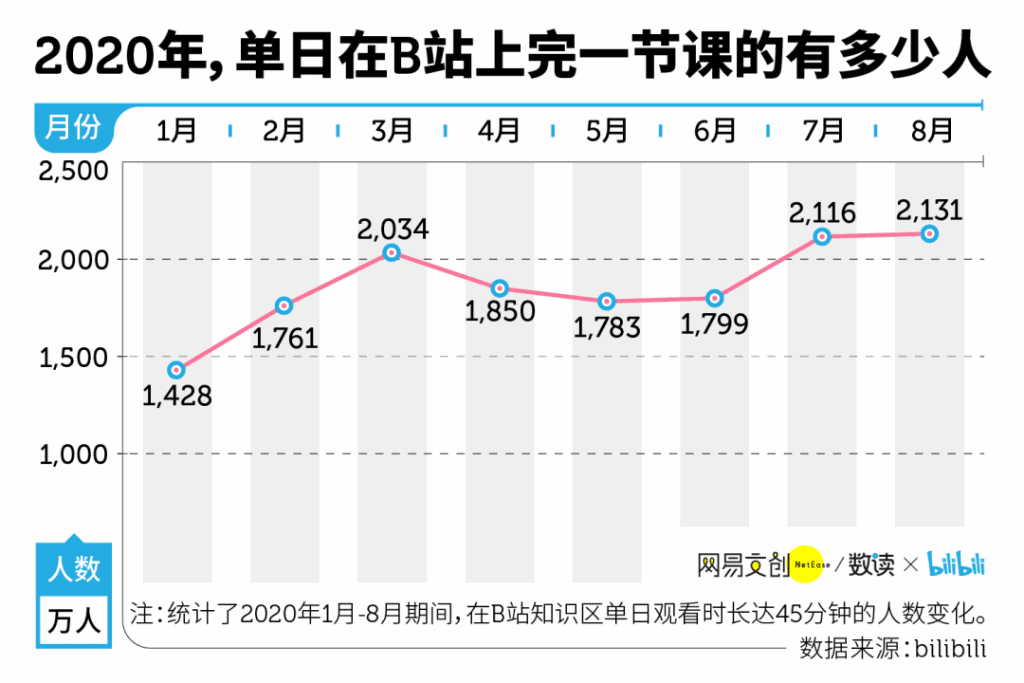Discovering Bilibili, China’s YouTube
Like YouTube, Bilibili has become home to an online learning community buzzing with life.

Bilibili is a YouTube-like video sharing website based in Shanghai, China. Launched in 2009, the company originally positioned itself as an online home for teenage fans of anime, comics and games.
Around 2015, Bilibili began diversifying its content to attract a broader audience. After years of development, it has become one of the top Chinese video platforms and has been dubbed the YouTube of China, as reported by TechNode.
Just like YouTube, videos on Bilibili are uploaded by users and vary wildly in terms of content. You can watch Chinese stand up and beatboxing, learn to cook, and even study with Coursera-style lectures on philosophy, computer science, and other topics.
Bilibili Goes Public

On March 28, 2018, Bilibili announced its initial public offering, which included 42 million American Depositary Shares (ADS), at a public price of $11.50 per ADS, for a total of $483 million.
Due to the tensions between China and the US, Bilibili also sought a secondary listing on the Hong Kong Stock Exchange, following the “homecoming listing” trend started by Alibaba.
Now, Bilibili has hit new record numbers: more than 72 million daily active users and 270 million monthly active users, according to its 2021 Q4 and Annual Financial Report.
| Date | Monthly Active Users | Total Net Revenue |
| Mar 31, 2016 | 28.5M | $11.1M |
| Mar 31, 2017 | 57.3M | $66.7M |
| Q4 2018 | 92.8M | $168.1M |
| Q4 2019 | 130.3M | $288.4M |
| Q4 2020 | 202.0M | $588.5M |
| Q4 2021 | 271.7M | $907.1M |
“Up Zhu” vs. “YouTuber”

YouTube creators are called “YouTubers”. Similarly, on Bilibili, creators are called “Up Zhu”. On Jan 11, 2022, Bilibili unveiled their Top 100 Content Creators of 2021. This was Bilibili’s fourth year publishing the list, which this time proved more diverse, with creators dedicated to a wider range of categories, including music, food, technology, and lifestyle — straying further away from Bilibili’s initial focus on anime and comics.
According to South China Morning Post, in 2020, how-to videos became one of the platform’s fastest-growing categories.
Learning on Bilibili
A particularly popular creator is a professor from a top Chinese law school. According to Six Tone, his channel, “Luoxiang Talking about Criminal Law”, with its engrossing lectures on criminal law, have attracted over 20 million subscribers, including students preparing for China’s National Judicial Examination. The channel has crossed 580 million views.
You can also learn math and physics from famous teacher Li Yongle on his channel “Teacher Li Yongle Official”, along with its 3+ million followers. He discusses daily life, science, and beyond through the lens of mathematics, like in his video “What is a space elevator”. His straightforward blackboard videos, and interactive and positive demeanor have struck a chord with learners on Bilibili and beyond: Li Yongle also has a YouTube channel with 1.87 million subscribers.
Life skills videos are also very popular on Bilibili, especially food making tutorials. Famous “Up Zhu” Gang Wangin has published over 600 videos on his channel, teaching viewers how to make delicious Chinese food from scratch. The same videos have also been uploaded to YouTube, attracting over 1.8 million subscribers.
Bilibili Feature: “Bullet Comments”

One unique feature of Bilibili — “bullet comments” or “danmu” in Chinese — has set it apart from many other video sharing platforms, including YouTube. Bullet comments are just lines of brief comments that fly across the screen during a video that originated from a Japanese cartoon site, NicoNico, making comments from viewers more visible. But bullet comments are usually shorter and express viewers’ emotions more directly, much like emojis in Twitch chats. This creates interaction and has resulted in a sense of community among viewers.
According to Bilibili’s report the “Year of Danmu”, by the end of 2021, over 10 billion bullet comments have been shared on the platform. The term “Po Fang Le” (which translates to “this broke down my defenses”) became the top “bullet comment” of 2021, reflecting viewers’ empathy when watching videos.
100+ Million People Learn on Bilibili

Bilibili is becoming a major platform for online learning in China, much like YouTube in the rest of the world. You can learn almost everything on Bilibili, from Psychology to History, Mathematics to Programming, and Cooking to Drawing.
In 2019, China Central Television revealed that studying on Bilibili is becoming a trend among Chinese young people: over 18 million people studied on Bilibili in 2018.
This trend continued to blossom. In 2020, the number of people who had watched educational videos on Bilibili reached nearly 100 million, based on data from NetEase. The most trendy video series, Introduction to Python, has been viewed over 13.6 million times. More than 19 million online learners enjoy watching psychology-related videos on the platform.
#StudyWithMe on Bilibili

In January 2017, a South Korean Youtuber called “Nojambot” posted a livestream tagged #StudyWithMe on Youtube and attracted more than 321k subscribers. Ever since, #StudyWithMe has been a trending topic on Youtube with a constant flurry of creators worldwide streaming their study sessions.
#StudyWithMe videos are also popular among Chinese creators. It’s reported that streams tagged with #StudyWithMe have accrued the longest live time since 2018. In total, #StudyWithMe livestreams reached 1.46 million hours in 2018, according to cctv.com. According to research, nowadays, 2,000–3,000 such livestreams are posted per day.
#StudyWithMe videos are typically characterized by their long duration (often 5–6 hours), soft background music, a peaceful study place, a timer, and creators either partially or entirely off screen. As you may guess, I finished writing this report in a #StudyWithMe livestream on Bilibili, in the company of other online students.
Tags







Eric
How to make money on Bilibili, is it same as YT in terms of make money or ?